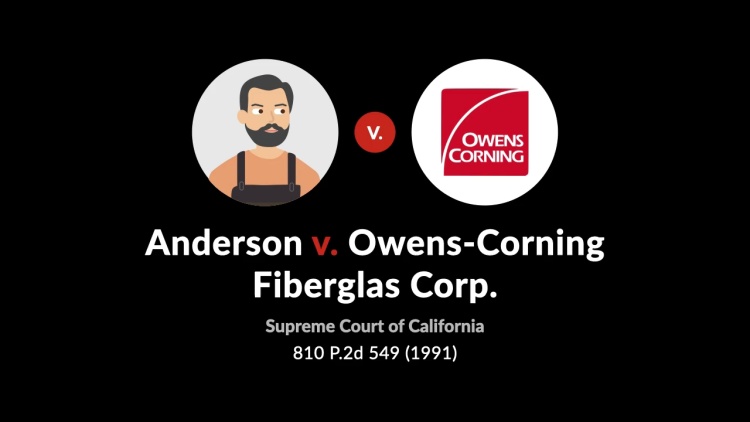Anderson v. Owens-Corning Fiberglas Corp.
California Supreme Court
810 P.2d 549 (1991)

- Written by Sean Carroll, JD
Facts
Carl Anderson (plaintiff) was exposed to asbestos by working with products manufactured by Owens-Corning Fiberglas Corp. (Owens-Corning) (defendant). Anderson brought suit on a theory of strict products liability claiming, among other things, that Owens-Corning failed to properly warn of the dangers inherent in exposure to their products. Owens-Corning’s pleadings raised a state-of-the-art defense, asserting that even the foremost scientists working at the time the products were sold could not have known the dangers of asbestos to users of Owens-Corning’s products. Before trial, Anderson moved to preclude Owens-Corning from presenting state-of-the-art evidence, and the trial court granted the motion. Owens-Corning argued that if it was precluded from presenting the evidence, then Anderson should be precluded from proceeding on a failure-to-warn theory, on the ground that the state of the art was the only defense to that theory. The trial court granted the motion. The jury returned a verdict for Owens-Corning, but the trial court granted a new trial after Anderson asserted that the court erroneously prevented him from presenting the failure-to-warn theory. The appellate court upheld the order granting a new trial. The appellate court noted that state-of-the-art evidence is not admissible in asbestos strict products-liability cases, including cases based on a failure-to-warn theory. The California Supreme Court granted review.
Rule of Law
Issue
Holding and Reasoning (Panelli, J.)
Concurrence (Broussard, J.)
Concurrence/Dissent (Mosk, J.)
What to do next…
Here's why 904,000 law students have relied on our case briefs:
- Written by law professors and practitioners, not other law students. 47,100 briefs, keyed to 995 casebooks. Top-notch customer support.
- The right amount of information, includes the facts, issues, rule of law, holding and reasoning, and any concurrences and dissents.
- Access in your classes, works on your mobile and tablet. Massive library of related video lessons and high quality multiple-choice questions.
- Easy to use, uniform format for every case brief. Written in plain English, not in legalese. Our briefs summarize and simplify; they don’t just repeat the court’s language.







